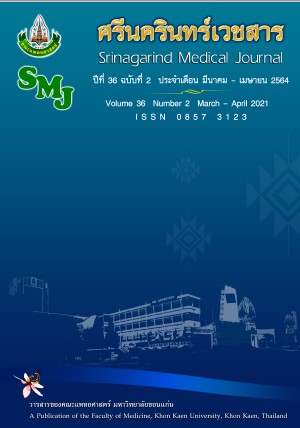ยาต้านเอนไซม์ไซคลินดีเพนเดนท์ไคเนส 4/6: ความหวังใหม่ของการรักษามะเร็งเต้านม
Abstract
บทคัดย่อ
ความสามารถในการแบ่งเซลล์อย่างไม่สิ้นสุดเป็นหนึ่งในคุณลักษณะพิเศษของเซลล์มะเร็งซึ่งมีกระบวนการทางชีวโมเลกุลหลายกลไกสนับสนุน การเพิ่มการแสดงออกของโปรตีนที่ควบคุมวัฏจักรเซลล์ ได้แก่ กลุ่มโปรตีนไซคลินและเอนไซม์ไซคลินดีเพนเดนท์ไคเนส เป็นกลไกหนึ่งที่สนับสนุนให้เซลล์แบ่งตัวอย่างต่อเนื่อง พบได้ในมะเร็งหลายชนิดโดยเฉพาะมะเร็งเต้านมซึ่งเป็นมะเร็งที่พบมากที่สุดในผู้ป่วยเพศหญิงทั้งในประเทศไทยและทั่วโลก ผู้ป่วยมะเร็งเต้านมมากกว่าร้อยละ 30 มีการแสดงออกของโปรตีนไซคลิน-ดี 1 เพิ่มขึ้น โปรตีนชนิดนี้ทำงานร่วมกับเอนไซม์ไซคลินดีเพนเดนท์ไคเนส 4/6 ซึ่งจำเป็นต่อการรอดชีวิตของเซลล์มะเร็งแต่มีผลเพียงเล็กน้อยต่อเซลล์ปกติ จากความรู้นี้ทำให้เกิดการพัฒนายาต้านไซคลินดีเพนเดนท์ไคเนส 4/6 เพื่อยับยั้งการทำงานของกลุ่มโปรตีนดังกล่าว โดยออกฤทธิ์ยับยั้งวัฏจักรเซลล์ในระยะ G1 ทำให้เซลล์มะเร็งหยุดการแบ่งตัว การทดลองในระดับปรีคลินิกและการศึกษาทางคลินิกในผู้ป่วยมะเร็งเต้านม พบว่าการใช้ยาดังกล่าวเพิ่มระยะเวลารอดชีพของผู้ป่วยได้เกือบสองเท่าเทียบกับกลุ่มที่ได้รับยาหลอก เป็นผลให้มีการรับรองการใช้ยาในเวชปฏิบัติสำหรับผู้ป่วยมะเร็งเต้านมในปัจจุบัน นับเป็นความสำเร็จหนึ่งของการประยุกต์ใช้ความรู้ทางวิทยาศาสตร์พื้นฐานเพื่อพัฒนายารักษามะเร็งให้สามารถนำไปใช้ได้จริงทางคลินิก
คำสำคัญ: มะเร็งเต้านม; วัฏจักรเซลล์; ไซคลิน; ไซคลินดีเพนเดนท์ไคเนส
Abstract:
The limitless of self-renewal and replication of cancer cells, one of cancer hallmarks, is supported by various molecular mechanisms. Overexpression of cyclins and cyclin-dependent kinases, a group of cell cycle machinery proteins, is one of the underlying mechanisms that promotes cell proliferation in several cancers, especially in breast cancer. Breast cancer is the highest prevalent cancer among female patients in Thailand and globally. Many studies revealed the overexpression of cyclin D1, a partner of cyclin-dependent kinase 4/6 (CDK4/6), in more than 30% of breast cancer cases. These proteins are indicated to be essential for survival of breast cancer cells but are disputable for normal mammary cells. These findings, thus, led to the development of CDK4/6 inhibitors which arrest the cell cycle at G1 phase and inhibit cell division. These inhibitors have been tested for their efficacy both preclinical studies in breast cancer cells and clinical trials in breast cancer patients. Patients who supplemented with these drugs had almost double longer survival times compared with those who received the placebo. The efficiency of CDK4/6 inhibitors, hence, urged the approval and implementation of the CDK4/6 inhibitors into the clinical practice. The discovery of CDK4/6 inhibitors is one of the successful translations of basic medical research to the clinical study which finally implemented in the clinical practice of breast cancer treatment at present.
Keywords: Breast cancer; cell cycle; cyclin; cyclin dependent kinase


